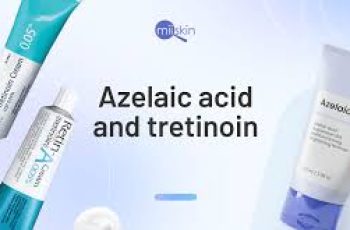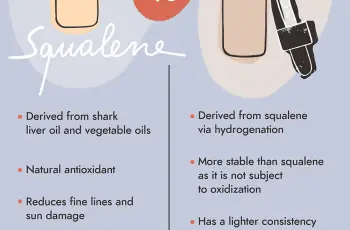
Alcohol in Skin Care: Is It Ever Okay?
Something may be hiding in your moisturizers that you haven’t given a second thought: alcohol. Alcohol comes in many forms — some that have the potential to dry out skin and leave it more prone to irritation, and some that can actually moisturize.
Lately, though, there is controversy surrounding just how much you should be concerned about alcohol in skin care. Should you avoid it entirely? Is it okay in certain amounts? We talked to board-certified dermatologists to help you make the decision that’s best for the health of your complexion.
The Purpose of Alcohol in Skin-Care Products
You can find alcohol in a variety of skin-care products, including makeup, lotions, fragrance, shaving products, oral care, and skin and hair products.
Alcohol, as defined by the U.S. Food and Drug Administration (FDA), is “a large and diverse family of chemicals, with different names and a variety of effects on the skin.” [1]
“There’s a number of reasons why alcohol would be added,” says Lauren Fine, MD, the medical director at Fine Dermatology in Chicago. “Alcohol will make the product feel more elegant and light, and it can also improve the overall feel of the product by making it absorb faster.”
In addition, alcohol is a possible preservative, though it’s not the main preservative, as there are other ingredients that fill that role.
Names for Alcohol on Skin-Care Ingredients Lists
Here are some of the ways you’ll see alcohol listed on skin-care ingredient labels.
Ethyl Alcohol This is also known as ethanol or grain alcohol, according to the FDA. Ethyl alcohol is denatured. To avoid paying taxes on the alcohol in cosmetics, companies use denatured alcohol to make it taste so bitter you’d never want to drink it, per the Science of Beverages. You’ll find denatured alcohol in makeup, lotions, fragrance, and skin- and hair-care products. It’s also referred to as SD alcohol.[2]
Isopropyl Alcohol You probably know this by its more common household name: rubbing alcohol. It’s found across a range of products, including for nail, hair, and skin care. It serves a variety of roles, including as an astringent, an antifoaming agent, and a solvent.[3][4]
Methyl Alcohol or Methanol Look for this in your bath products, notes CosmeticsInfo.org. It is considered a denatured alcohol.[5][6]
Benzyl Alcohol An alcohol naturally found in fruits and teas, per the Encyclopedia of Toxicology, you’ll find it in soaps, cosmetics, cleansers, and hair products.[7]
Cetyl, Stearyl, Cetearyl, or Lanolin Alcohol These are fatty alcohols, making them vastly different from the traditional alcohols used in skin care, per the FDA.[1] You can find these in hair conditioner, foundation, eye makeup, and skin moisturizers and cleansers. These help moisturize skin; when used in formulations, they also prevent oil and liquid from separating.
The Debate: Is Alcohol in Skin Care Good or Bad?
There are pros and cons to using alcohol in skin care. Alcohol can penetrate oil buildup and dissolve dirt and grease on the face, says Gretchen Frieling, MD, a board-certified dermatopathologist in Wellesley, Massachusetts. But Dr. Frieling says you have to consider your skin type and goal. For instance, if you have extremely oily skin, an alcohol-based toner may help reduce pore-clogging sebum. But if you have dry skin, sensitive skin, eczema, or allergies, that same alcohol-based toner will dry out your skin, she says.
Some people have raised concerns that because alcohol enhances the penetration of other ingredients, skin may be more likely to absorb potentially toxic or harmful contaminants in a product, per research.[8]
Despite the controversy, the presence of alcohol is generally not something to fear, as long as you’re purchasing a product that uses it in small amounts (more on this later). “Alcohol is found in so many skin products, and most people use it without problem,” says Dr. Fine. For normal skin types, alcohol is unlikely to cause a problem with your skin.
Yet if your skin is sensitive for any reason, scan the ingredients label. “If your skin barrier is not intact due to irritation or a rash, then alcohol has the potential to be irritating. It’s going to burn [when applied], though that can be said for almost any product when skin is compromised,” she says.
Look at the Location of Alcohol on the Ingredients List
As with a food label, you can get a sense for how much alcohol is in a skin-care product by examining where it lands on the ingredients list. “In small or reasonable concentrations, products can still benefit from the good effects of alcohol to optimize their product while reducing the bad effects,” says Frieling.
If alcohol is one of the top ingredients, the product is likely to dry out skin, says Fine. With chronic use, this could disrupt your skin’s barrier. A disrupted barrier allows moisture to escape and gives potential irritants a way in, resulting in redness and inflamed skin.
A reasonable place for alcohol to appear is lower on the ingredients list. “If it is lower in the list, past sixth, it may not be concentrated enough to deplete your skin’s barrier,” says Frieling. She recommends staying away from products that contain ethanol, methanol, ethyl alcohol, isopropyl alcohol, SD alcohol, and benzyl alcohol, “especially if these are listed high in the ingredients, as they can pose a problem for dry skin,” she says.
Of course, this can be tough to wade through on your own. An easy solution is to bring your products to your dermatologist and discuss your concerns.
Finding Alcohol-Free Skin-Care Products
If a product is labeled “alcohol-free,” it will not contain ethyl alcohol, per the FDA. Yet one look at the ingredients list might tell you your product includes fatty alcohols like cetyl, stearyl, cetearyl, or lanolin alcohol. Those are an entirely different category.[1]
Helpful Types of Alcohol in Skin Care
Fatty alcohols such as cetyl, stearyl, and cetearyl alcohol are derived from fats. “Fatty alcohols are often found in cleansing lotions and moisturizers as thickeners and emulsifiers,” says Frieling. They aren’t irritating and can be beneficial. “Because of their ability to lock moisture into the skin and form a protective barrier that water can’t penetrate, products with these ingredients work best for dehydrated skin,” she says.
Lanolin alcohol is derived from wool. It can be a source of contact dermatitis, but when specially formulated, it can actually be gentle, even for wounded skin, according to one study. The research looked at the effects of a wound-healing ointment containing a specially formulated lanolin alcohol; of the nearly 500 people analyzed, none developed a contact allergy to the product.[9]
Other Concerning Ingredients That Could Irritate Your Skin
If you find that your skin is sensitive to products that contain alcohol, consider that the source of the irritation may not be alcohol at all, Fine says. Preservatives like parabens and fragrances can do a number on skin, according to DermNet. To know if your product has a paraben, look for ingredients that end in “-paraben,” like methylparaben and butylparaben. To find fragrance, look for “fragrance.” (You can also buy products explicitly labeled “fragrance-free.”)[10]
Hair dyes and wet wipes can also trigger irritation on your face, research shows. It can be difficult to know exactly what you’re reacting to, so it’s helpful to engage a dermatologist to find out. Your doctor can analyze your products to find common players or determine if you need a patch test to identify the offending ingredients.[11]
A Final Word on Alcohol and Skin-Care Products
Alcohol can be a useful addition to help ingredients penetrate the skin, preserve the product, and make it feel lightweight when applied, says Frieling. In smaller amounts, it’s unlikely to be harmful, but be especially careful if you have sensitive, dry, or eczema-prone skin. Most important, read the label and ask your dermatologist if you have concerns that the alcohol within is causing skin woes.
The Takeaway
Depending on its type and quantity, alcohol in your skin care can either dry out or hydrate your skin. Too much ethanol or isopropyl alcohol might irritate sensitive skin, while fatty alcohols can actually help lock in moisture. To protect your skin, consider asking a dermatologist to review your skin-care products to make sure they work for your skin’s unique needs.


